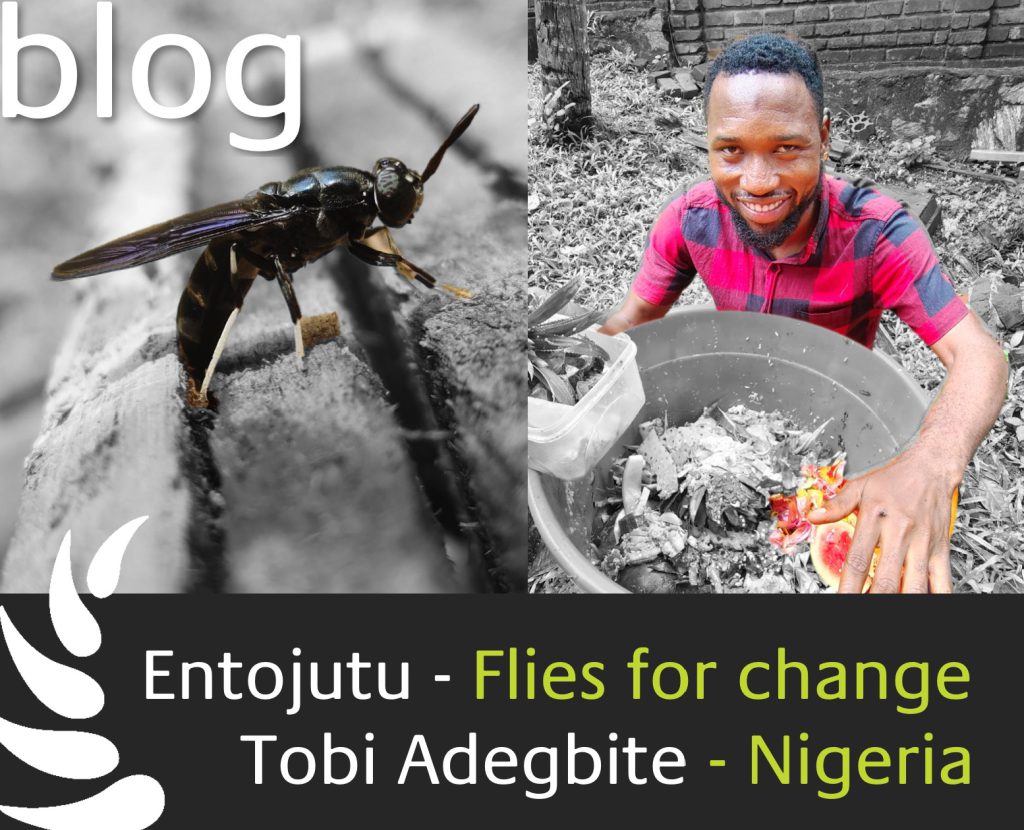Adegbite Tobi Gabriel is from Nigeria. Tobi has studied biology and has practical experience as a farmer.
Farmers in Nigeria face many challenges, and because of inadequate practices, many are in debt. An additional problem is organic waste that is left to rot, contaminating the environment, releasing methane (a greenhouse gas) and causing odor. Being a farmer himself, Tobi faced all these problems firsthand. However, he found that a small insect, the black soldier fly, could be the key to a sustainable solution. Through his organization “Entojutu”, Tobi offers a new solution for old problems, a solution that has the potential to revolutionize our current farming practices.
When I was about five years old, my mum tied my left hand to my back.
In our culture the right hand is ‘the right hand’ and, therefore, should be used for everything! So, being left-handed, I was doing ‘it wrong’. She even instructed the teacher at school that no one should untie my hand. I felt embarrassed and completely useless. I couldn’t do anything. Three days later, a teacher from a neighbouring school who had observed me from a distance followed me home and told my mum that my choice of hand is natural and forcing to change this could hinder my intellectual capabilities. My mum was convinced, and ever since, she has defended me anytime a member of our society stood to correct me. This incident shaped my life. Instead of being forced to fit in, we learnt that our actions or inactions towards what is perceived as ‘the norm’ can effect or stall change.
Water scarcity was common in the north of Nigeria where I grew up. When the water taps ran dry, my dad would take me to the governmental secretariat to fetch water. There, I saw the World Health Organization for the first time. They were helping locals and the underprivileged by providing mosquito nets and other forms of aid. I was ten years old and knew what I wanted to do when I grew up: to work for the WHO.
It shaped my educational path, studying biochemistry in university and even further on to studying environmental biology and public health on a master’s level. During this time (2015), I worked with several organizations who focused on the environment, agriculture, and climate change. It drew my interest, so I became an activist, talking about the damage that has been done to the environment. I spoke at student meetups and joined several student organizations. However, it soon got to a point where I understood that just talking was not going to make a difference. What was needed was action. As a hobby, I had been growing vegetables. So, I decided to get into agriculture, and of course I would do it the right way, and BIG! With a small team, I started farming on a 20-acre sized plot of land. But at the end of the season, we understood that WE HAD FAILED. My team fell apart, and my partners left me. I decided to give another try at organic agriculture, and yes, again BIG, this time on 32.5 acres of land. And…I FAILED again. However, this time, I ran into bigger problems … serious debt.
To find a way out, I started a course in agribusiness. But the content was the same as what I had been practicing on my farm. This is one reason why the local farmers in Nigeria remain poor and plunge into debt and depression. It made me angry. I went home; I didn’t talk to anyone. It was while browsing the internet, on that day, Thursday 01-11-2018, when I saw a little post about black soldier flies. It blew me away. These flies eat organic matter and convert it to compost, and the larvae can serve as feed for poultry, fish, pigs, and other animals. I was hooked. I couldn’t sleep. I learned all night about the fly, and the next morning, when I told my friend, he couldn’t shut me up. This started a long stretch of learning. I was startled by how such a small insect could be instrumental in solving a big problem.
Having been a farmer, I know the costs of running a farm, the horrible experiences farmers go through when they run into debt, and the challenge of what to do with organic waste. The black soldier fly can be one key to a sustainable solution. As the larvae of the fly feed, they grow into a highly nutritional biomass that can be harvested and further processed into animal feed ingredients, while the waste residue can also be used as biofertilizer.
So finally, I reached a point where I could act, using the black soldier fly, to help farmers become less dependent on commercial feed for their animals and, at the same time, get the organic waste problem solved too!
And… I am thankful to my mum. Thanks to her, I am Tobi, the left-handed fly farmer!!!
If you, like Tobi want to make a difference by starting your own organisation, then apply today to become a kanthari participant: apply via https://www.kanthari.org/
The next course starts in April 2022. Don’t miss



